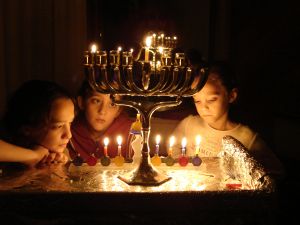
When we think about Purim as parents, we probably think most about this: “What shall I dress my children as this year for Purim?”
But in a hopefully growing number of families, including ours, the question isn’t what are we going to dress our children as for Purim. In our family, we ask ourselves what are we going to dress as for Purim?
I would wager a bet that no more than 10-15% of families attending Purim services and/or carnivals this year will come in costume. Why?
The phenomenon is often referred to as “pedicatric Judaism” and I find that Purim is its paradigmatic Jewish holiday. I Googled “pediatric Judaism” to see who should get credit for its coinage and the best I could come up with was the following from a Reform Judaism Magazine article:
Why, then, the emphasis on what Rabbi Larry Hoffman, professor at Hebrew Union College-Jewish Institute of Religion, calls “pediatric Judaism”? “We have planned for our children only,” he wrote in 1996. “In our understandable anxiety to pass on Judaism as their heritage, we have neglected its spiritual resources for adults, leaving ourselves with no adequate notion of how we too might draw sustenance from our faith as we grow up and grow older.”
That sounds about right.
Far too often, even those who are the most engaged – the ones who do affiliate with synagogues and do try to provide their children with Jewish educational experiences – they work to ensure their children experience and participate, but neglect to include themselves.
When as a graduate student in Los Angeles, I first attended a synagogue in which adults participated in Jewish holiday celebrations as adults – active, joyous and engaged – it was almost surreal. This was not a Judaism for children – costume contests, parades, pony rides and candy (although that may all have been there as well) – but a Judaism that adults took seriously for themselves. They were not lining the walls watching the children within; they were celebrating the joy of being Jewish for themselves.
What’s the danger of “pediatric Judaism”? For me it is the perpetuation of the idea that being Jewish, or perhaps more accurately doing Jewish, is something that is only for children. We are our children’s most powerful role models and teachers and they are surely paying attention. When they can see that we take something seriously, it is a signal to them that they ought to as well. Children learn how to be an adult by watching our adult behaviors. We understand this as parents and so we think carefully about how we behave in front of our children, what kind of language we use, and what kind of values we express and try to live by. So, too, it is with being a Jewish adult. Our children are looking to us to see what adult Jews do and it presents us with a big opportunity and a huge responsibility.
I don’t wish to pile on parents. Jewish schools and institutions play a part as well. If Rabbi Hoffman is correct that adult Jews do not see in Judaism a resource to find their spiritual needs met, we have to be willing to ask the difficult question of why? What programs, classes, experiences, outreach, etc., have we not successfully offered or facilitated that have led to this situation?
We will all need to do more if we are ever to cure ourselves of pediatric Judaism. In our schools and our synagogues, we need to reach out to parents and provide them with the support, education, experiences and love they will need to find the courage to try on new ideas and behaviors. We will need to present a Judaism worthy of the education and sophistication of our parents. Luckily, Judaism contains within it all that and more.
So this year…what are you going to be for Purim? Don’t let your children have all the fun…and don’t let them think that the fun of Purim is only for them!














